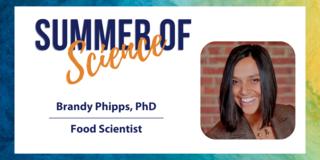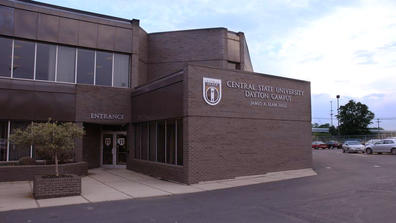Central State University associate professor uses food science to uplift her community

The Association for Women in Science (AWIS) is kicking off the #SummerOfScience! We will be highlighting AWIS members and partners to show the impact different fields of science have on society — and how these fields are impacted by women.
2022 AWIS Spark Awardee Dr. Brandy E. Phipps carved her own path as a woman scientist of color with a laser focus on inequities in science education and in the food system.
Dr. Phipps, newly tenured and promoted associate professor and researcher in the agricultural program at Central State University (CSU) in Ohio, describes her journey in food science as a “lovely, winding path.” She began by earning a BS in nutrition sciences from University of Florida and advanced to an MS in human nutrition, food, and exercise at Virginia Polytechnic Institute and State University (VPI). Following her PhD in biomedical and veterinary medical sciences from VPI, she served as an assistant professor of biology for three years at a liberal arts college, after which she made the conscious decision to leave academe, precipitated by a confluence of forces, including being the lone person of color in the department and a first-time mother, for which she felt a lack of institutional support.
Despite the caveat from her faculty colleagues that she would never be able to return to a tenure-track academic position, she forged ahead into food issues in communities. She became an executive officer of the board of directors for a food bank and for a domestic violence shelter and chaired a county food council. These positions exposed her to collaborators from various sectors, including policymakers and local governments. “This community work transformed my professional identity from that of a scientist focused on a narrow area of research to a systems thinker,” she observes. She feels deeply grateful when she looks back on the opportunities that initial serendipitous transformation provided.
A Return to Academe
Serendipity struck again when she decided to test a return to academe by adjunct teaching at a community college, all the while remaining involved in community organizations, including one focused on nurturing young women as future scientists. While serving as a judge at a district science fair held at CSU, she was approached by a faculty member who tried to recruit her to a tenure-track faculty position at CSU. She declined then and subsequent times, but with persistent encouragement from that faculty member and Dr. Phipps’ partner, she applied. In 2019, some 13 years after she had left her first professorship, she returned to academe and resumed the tenure-track as an assistant professor in the department of agricultural and life sciences and a researcher in the agriculture research and development program at CSU. Reflecting her commitment to the mission that is unique to CSU’s institutional context of both an HBCU and land-grant institution, she shares her knowledge of the challenging history of HBCUs and tribal colleges, which received recognition as land grant institutions decades later than their primarily white counterparts.
She has received awards spanning local to national recognition for her teaching, service, and research. Asked about the impact of the Spark Award on her career, she replies that it is too early to determine a specific impact, but notes that since she is at an HBCU, she considers all her accomplishments as recognition of CSU’s unique contribution to the advancement of its students. On a more practical note, she adds that awards are helpful in faculty tenure and promotion and seem to have a positive impact on students.
Although too busy running concurrent research projects and establishing a new Sustainable Nutrition Sciences lab to think concretely about a next possible step, she keeps in mind a mantra of “never hold tightly,” which aligns with her personal ethos, “Do the best you can with what you have, where you are, for a long as you can.” She feels called to CSU for the foreseeable future. And she has several proposals in the works, including one to nurture Black and indigenous high school students from K12 through graduate school in agriculture/food science systems. She is open to future opportunities, as long as they hew to her vision of systems thinking and equity in the science ecosystem.
Solicited for advice for other women scientists, she says, “Speaking the truth about your accomplishments is not ‘tooting your horn’. Our accomplishments also uplift our communities — our institutions, women in science, our families and support people, our mentees and trainees. Seek out mentors, like-minded individuals, and support systems, but ultimately trust yourself. Fem presenting or nonbinary women are taught to seek outside validation and approval and need to learn to trust themselves.” She adds, “Think about your personal vision and mission before you think about a job.” When that advice is tailored to students interested in agriculture/food science, she adds, “Agriculture and food systems is in need of people from all disciplines, not just those interested in soil, crops, and livestock: biologists, ecologists, engineers, economists, marketing professionals, accountants, nutrition scientists, microbiologists, and social scientists.”
Patricia Soochan is a program officer and member of the multidisciplinary team at Howard Hughes Medical Institute (HHMI), with primary responsibility for the development and execution of the Inclusive Excellence (IE1&2) initiative. Previously she had lead responsibility for science education grants provided primarily to undergraduate institutions, a precursor of IE. She participates in the Accelerating Systemic Change Network and is a contributing writer for AWIS Magazine and The Nucleus. Prior to joining HHMI, she was a science assistant at the National Science Foundation, a science writer for a consultant to the National Cancer Institute, and a research and development scientist at Life Technologies. She received her BS and MS degrees in biology from George Washington University. The contents of this article are not affiliated with HHMI.
© 2023 Association for Women in Science. Reprinted with permission.


